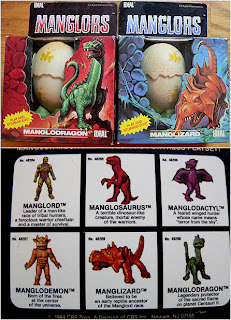My wife wondered if I would have any interest in owning and operating a comic book store, with the onus of requiring it to be profitable essentially removed from the equation. I was unhesitating in answering in the negative. I’ve never even briefly entertained the fantasy of owning a comic book shop, with or without the whole be-my-own-boss/make-a-living aspects, because it always struck me as kind of a grind, as most retail jobs are. I’ve never worked in someone else’s comic book shop, either, but I did hold down a gig at an ice cream parlor in my high school days and I imagine the similarities would stand out: I like visiting those establishments, I enjoy consuming what they sell, but laboring on the employee side of the counter day after day after day isn’t a ton of fun.
Nonetheless, I understood the logical appraisal of my interests implicit in my wife’s question, and that got me thinking about how I could incorporate all of the geek trappings I love surrounding myself in with something vaguely resembling a job, without all the clock-punching drudgery. And then it hit me: curating a toy museum.
From what I understand or can imagine, managing the stock of a comic book shop is mighty boring: every month you order a certain number of copies of the latest issue of the currently-published titles and/or the new releases of graphic novels and trade paperback collections, as well as a certain amount of related merchandise largely determined by the physical size of your store and the type of customers you tend to draw. And you hope that you sell everything you paid for, without running out so quickly that you lose customer loyalty, but also without overstocking so much that you are hemorrhaging profits. Some comic book shops also pride themselves on stocking much older back issues of comics, or out-of-print books, or vintage merch, or whatnot but that’s almost always a secondary concern at best. If the hot, high-sales-volume items right now are nine different series featuring Wolverine, or bookends shaped like Twilight characters, or whatever, then that’s what you become a vendor of. And the process is even more mechanical by virtue of the fact that there are very few distribution channels for comic book shops, so you basically get one catalog that tells you what the hot items are that month, and you order off that master list, and stock your shelves when the boxes show up.
Ah, but a museum is a completely different thing which traffics in the enduring past, not the fleeting trends of the moment. That’s more my speed. If I want to surround myself with Manglor toys in my museum I can do so whether or not there’s a Hollywood adaptation of the franchise due in a couple of months.

Of course, that’s assuming I can find any Manglor toys, but again that’s part of the charm. Instead of ordering formulaically out of a catalog I would have to hunt down the subjects of the toy museum exhibits, which undoubtedly would include some fierce eBay bidding and Amazon hunting expeditions, but also a fair amount of backroads wandering, independent store visiting and general plaything prospecting.
And once I had put together a retrospective’s worth of a certain toy line, I would still need to assemble a proper display area for them. Much as any decent natural history museum is likely to choose to build an entire fake Mauritian beach on which to situate its reconstructed Dodo family rather than simply stand them in empty glass cases, I would similarly while away the hours constructing elaborate diorama environments as backdrops for the toys, from sci-fi cityscapes to run elaborate loops of Hot Wheels tracks through to jungle planetscapes to (barely) contain Herculoids action figures. Granted, I kind of indulge in that already, since I usually open up toys as I buy them and position them on bookshelves, with some props and simple stage-dressing whenever possible. It would only be a matter of more elaborate and involved fake scenery, facilitated by unlimited monetary resources and free time.
Plus instead of being set up in a spare room in my basement, the toy museum would occupy an entire building unto itself (someplace adjacent to the horse farm where my wife and I and our family would live, as per her half of this lottery-winning dream) which would be much more accessible to the general public, who could gain access to its wonders during museum hours six days a week for a “suggested donation”. I’m no accountant, but I’m pretty sure owning and operating a repository of our shared culture is worth double tax-deduction points, at least.

No comments:
Post a Comment